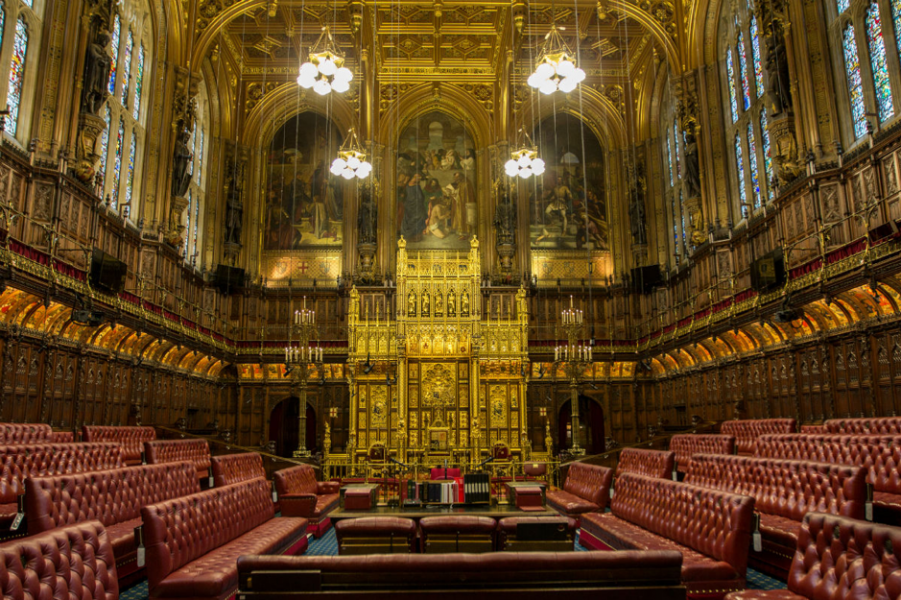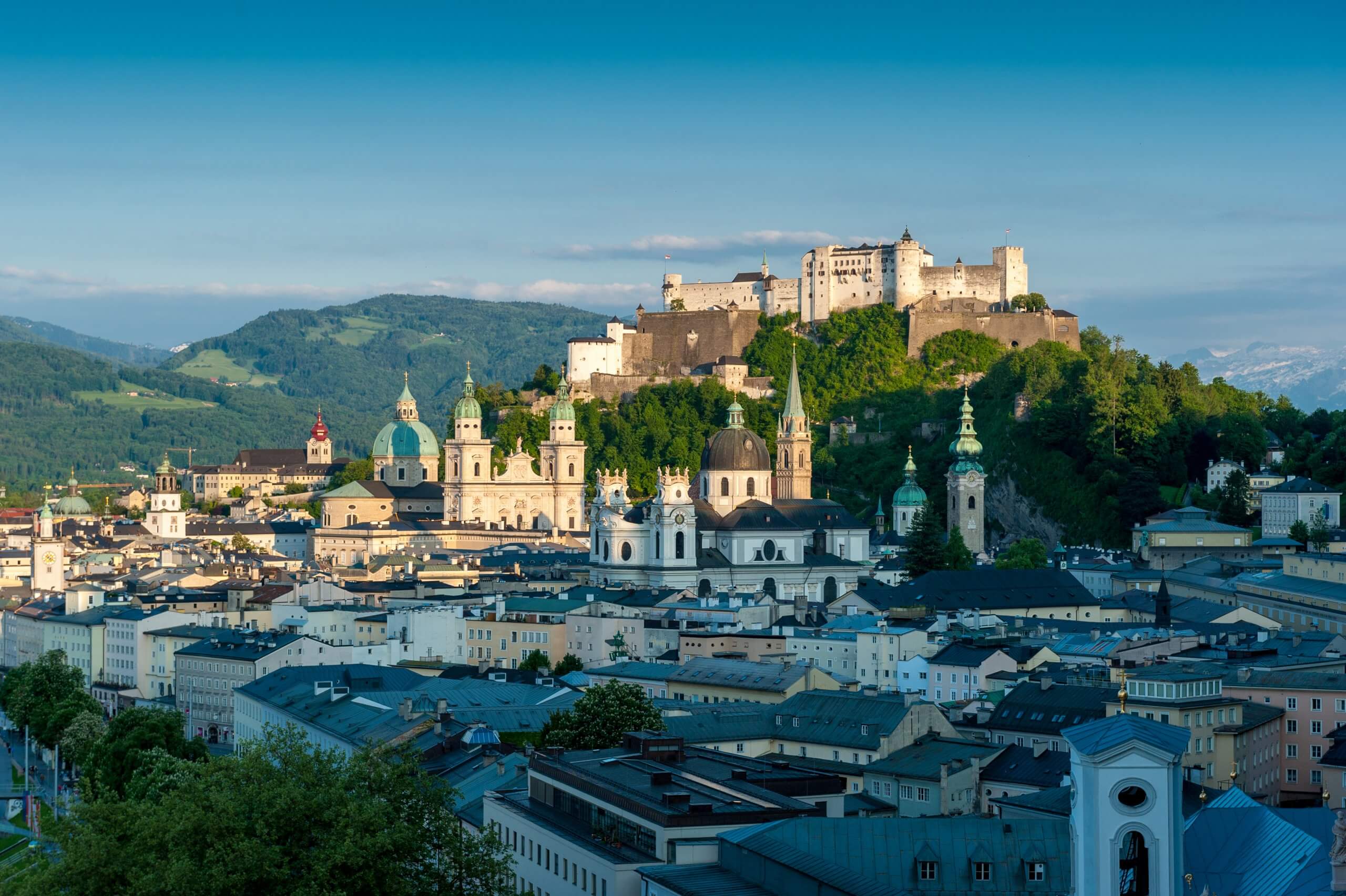Photo: the sacralised baroque cityscape of Salzburg, Austria.
I was recently ensconced in one of the last all-male environments permitted in contemporary society – a barbershop – and, as I had my haircut, the free-wheeling conversation inexorably turned to the current COVID episode and from there to the wider Western crisis. After my barber voiced a familiar litany of many of the woes afflicting Western civilisation and I nodded along sympathetically, he eventually sighed and asked, so what is the answer? I had piqued his interest by gradually suggesting that many of the pathologies he had correctly identified had a common origin in the spiritual malaise affecting western man, and so I judged the moment right to somewhat boldly say, “the only answer is for men’s hearts to turn back to Christ and Europe be faithful to her Baptism.” The shop fell suddenly silent. “Well, you did ask me!” To this day there is still a subconscious sense, and therefore guilt, deep in the soul of most Europeans, that we possessed the pearl of great price and that we threw it away.
Hilaire Belloc famously wrote that “Europe is the Faith, and the Faith is Europe!” While something of an exaggeration, it is true that for whatever mysterious reasons of Divine Providence, Europe is where the Faith was accepted by civil society, and then by the civil power, and was thus allowed to take deep root. We should meditate on how extraordinary it is that St Peter chose to go to Rome, to go to the seat of the civil power that had condemned his Lord to death on the Cross. Caesar Augustus was seen as the ‘prince of peace’ and ‘son of god’ because he was the guarantor of the peace and order, the Pax Romana; sometimes ruthlessly maintained, that obtained in the bounds of the Roman Empire and allowed for the development of a great pagan civilisation. This peace and order providentially helped facilitate the spread of Christianity so that by the time of the late-Empire, Christianity had, in a certain sense, become co-extensive with the Roman Empire.
This ‘first Christendom’, of the converted Roman Empire, succumbed to the great migrations of the Germanic barbarians, and it was the Church who kept civilisation alive, and began the slow and painstaking work of converting the barbarian nations and rebuilding civilisation in Europe. The French Romantic counter-revolutionary François-René de Chateaubriand famously wrote: “The genius of Christianity was not in destroying paganism but baptising it.” Christians don’t have earthly utopic visions but seek to baptise reality as it is. Thus it was that the brutal and coarse barbarian people of the north were converted, edified and shaped by the leaven of Christianity during the Benedictine centuries of the first millennia – the foundation of everything that followed.
When the King of the Franks, Charles the Great, was crowned by Pope Leo III on Christmas Day 800AD as “Emperor of the Romans,” men celebrated the Renovatio imperii Romanorum, a formula that expressed the hallowed work of renovating the Roman Empire for Christ. Men had never thought the Roman Empire destroyed, but rather that it had gone into abeyance, at least in the West, and now the Church was renewing the only truly legitimate civil power on Earth by sanctifying her as the temporal defender of the Church and, in a sense, the temporal side of herself.
We must not neglect the cosmic scope of this formal establishment of Christendom. Something deep was happening in men’s souls. Gradually, the Sacraments were reshaping civilisation. Across Europe cities were being built around the monasteries that were taming the land, keeping learning alive, and singing praise to God’s glory. Later, hospitals would be created so that the dying and the sick could receive the sacrament of anointing and the Viaticum. Prisons would be created so that the reprobate had somewhere to receive the sacrament of penance and be absolved of their sins. Alms-houses, schools, universities – all originated with the Church. Shrines, and soon after, towns, were built around saints’ relics. Not only was the world sanctified – the word sacred meaning anything that touches the worship of God – it was sacralised.
Sacrality has a more subtle meaning than sanctity – it can be defined as anything that directs man in the temporal sphere towards worship of God. Medieval organic society was suffused with the sacral. Even a gothic pointed window in a tavern room inspired a man to lift his soul to heaven in prayer before he retired to bed. Thus, the whole of society in Christendom aimed to harmoniously conform to the natural order ordained by God in creating the universe, and to the supernatural order inaugurated with the Redemption and inspired by the Church.
This was a world being touched by heaven, where the Divine was penetrating and transfiguring the world. This was the medieval synthesis, the Via Antiqua, the marriage of God and man, Christ and Church, Earth and Heaven, eternity and time, Church and State, faith and reason, grace and nature, body and soul, man and woman. It was a liturgical polity, a sacramental organism, where the channels of God’s grace breathed faith, hope and charity not only into persons but into societies.

The Sovereign’s Throne in the Chamber of the House of Lords beneath the painting, The Baptism of King Ethelbert of Kent, which represents the baptism of England herself (designed by a Catholic, Augustus Pugin).
For Europeans today, Integralism is therefore not abstract, but concrete, at least historically. It is present in the ruins of Christian civilisation all around us. It is in the names of our cities and villages and in the residue of the sacralised culture, traditions and customs that still linger in our secular society.
For whatever mysterious reasons, by God’s providence, the debate to recover the Church’s traditional teaching (now encompassed by this term: ‘Integralism’) has very much intensified not in Europe but in the United States of America, the first ‘European’ nation founded that explicitly ignored the Divine Revelation of Jesus Christ, and subsequently a major protagonist in the Revolution to dissolve the Christian Social Order.
Dr Alan Fimister and Fr Thomas Creen correctly define Integralism as: “the application to the temporal, political order of the full implications of man’s supernatural end in Christ and of the divinely established means by which it is to be attainted” (Integralism: A Manual of Political Philosophy). I must confess I have never been entirely comfortable with the label ‘Integralism’ as it has arisen. As the former private secretary of Charles Maurras, Jean Madiran wrote: “the terms ‘integralists’ and ‘integralism’ were born and spread as political sobriquets.” I know that the term simply refers to the Church’s teaching on the obligation of political communities to establish Divine Revelation as the ultimate source of public policy and public law, but I am saddened to see this sublime teaching often reduced by its opponents to just another ‘ism’ in the marketplace of ideas, as though it were an optional position for Catholics to take. Nevertheless, I can understand why we might rally to the term as a practical but provisional tactic.
I have also noticed the regrettable tendency of American Catholics to see Integralism as theoretical, and therefore purely in abstract terms. Such an inclination is false, since parts of the modern United States were parts of Christendom! Just look at Mission Concepcion in Texas, St Louis Cathedral in New Orleans, or the loveliness of Mission San Juan Capistrano in California, where the Lumen Christi still lingers. These were parts of the Lesser Christendom of Hispanidad, that was subsequently attacked and nearly expunged in the New World by Protestant-Masonic Britain (and later the unjust invasion of Mexico by the United States!). If American Catholics would re-root her identity here in the Baroque Catholic spirit rather than in the New England Puritan spirit, she would be a merrier place.
There is another American tendency towards pragmatism. This is also a lamentable English inheritance and, in its calculating and materialist mindset, anathema to the spirt of the Gospel. Many criticisms of Integralism claim that the doctrine is just not ‘practical’ and therefore of no use to lay Catholics today. How realistic a prospect is it that the United States be converted and formally recognise the Catholic Religion as true? Such an inclination is antithetical to how Christ taught us to approach the world. Our Lord taught us: “Seek ye therefore first the kingdom of God, and his justice, and all these things shall be added unto you.” Even an elementary knowledge of Christian history should teach us that God has awarded great fruits to those faithful who laboured against seemingly impossible odds for His sake. The cause of the conversion of the United States of America is no different and will begin when men of good will leave the false paradigm of Enlightenment thought and step into the great adventure of conquest for Christ.


